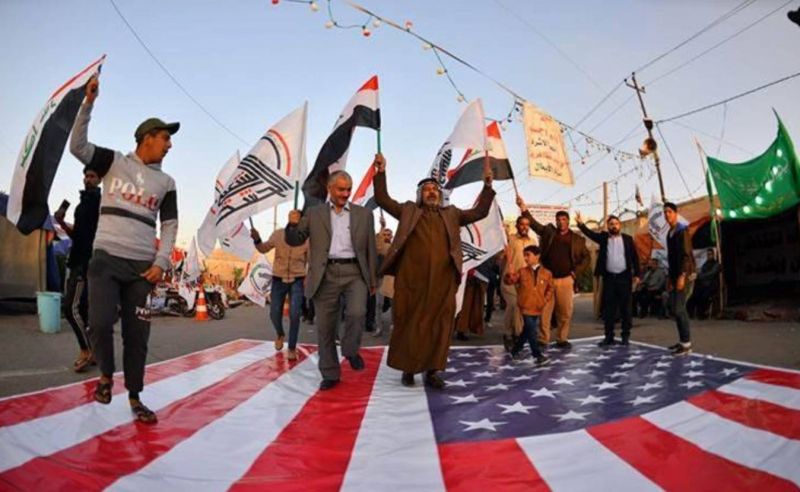
Protesters in Najaf, Iraq, trample an American flag. (Credit: AFP archive photo)
Washington announced on Sunday that strikes on the Syrian-Jordanian border zone killed three American soldiers and wounded dozens overnight.
The attacks were claimed by the pro-Iranian group, the Islamic Resistance in Iraq, which has been active since October 7 and is affiliated with the Hashd al-Shaabi (Popular Mobilization Forces). The offense has crossed the red line drawn out by the United States to ensure the safety of its citizens.
Nicholas A. Heras, Director of Strategy and Innovation at the New Lines Institute, analyzes the implications of the escalation on US presence in the region, amid the Gaza war.
Q- To what extent was it the intention of Iran and its proxies to cross the US's red line of fatal casualties among its troops?
A- The Iranians are well aware that any attack that their proxy groups make against sites where US forces are present could result in American casualties. Iran seems to have changed its risk calculation since the war in Gaza began in October 2023, and Iranian-backed groups in Iraq and Syria no longer have as many restraints on them as before. The Iranians seem to have decided that they can push hard on the United States and potentially force an American withdrawal from Iraq and Syria.
Q- How can the US react, to retaliate and restore deterrence, if still possible?
A- President Biden is in an election year and the Biden team will want to walk a policy tightrope that demonstrates to the American people that Biden will be steadfast in confronting the opponents of the United States while avoiding another major war in the Middle East. The US will likely respond with significant airstrikes against Iran-backed forces in Syria and potentially in Iraq, and warn the Iranians that further US casualties could result in American strikes directly against Iranian assets, likely starting outside Iran itself.
Q- To what extent can this incident impact the decision of the Biden administration to withdraw its troops from Iraq and Syria?
B- The Biden administration is still trying to pivot to Asia to outcompete China and to continue to confront Russia in Europe, and what the Biden team is trying to avoid is a drawn-out, metastasizing conflict in the Middle East triggered by Israel's military campaign in Gaza. Iran is executing a campaign against the US in the Middle East that essentially treats the US military presence in the region as an extension of Israel. This means that Iran is willing to take on more risks via its proxies to make the situation for the US difficult in Iraq and Syria, to try to force the US to withdraw from those countries. From the Iranian perspective, forcing the United States out of Iraq and Syria strategically weakens Israel. The Biden administration is not inclined to withdraw from either country immediately, especially if it were to appear that Iran forced the US out.
This article was originally published in French in L'Orient-Le Jour.